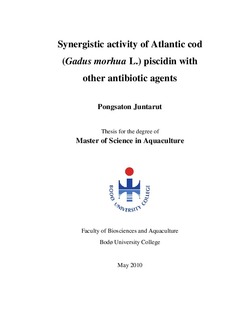Synergistic activity of Atlantic cod (Gadus morhua L.) piscidin with other antibiotic agents
Master thesis
Permanent lenke
http://hdl.handle.net/11250/141197Utgivelsesdato
2010Metadata
Vis full innførselSamlinger
Sammendrag
Disease management is crucial in the aquaculture industry and to date it
involves the usage of antibiotics to treat and prevent disease, especially bacterial
infections. However, there is a growing concern over the problems caused by
conventional antibiotics in aquatic and terrestrial environments (eg, bacteria resistant
to multiple antibiotics). Therefore, it is crucial to reduce the usage of conventional
antibiotics or find alternative novel antibacterial agents to manage bacterial diseases
and antibiotic-resistant bacteria. Antimicrobial peptides are natural antibiotics
produced from multicellular organisms and have the ability to kill bacteria and to
synergise with other antibiotics. In this study I have analysed the in-vitro antibacterial
activity of synthetic Atlantic cod piscidin and its ability to permeabilize the bacterial
membrane. Moreover, I have investigated the antimicrobial properties of synthetic cod
piscidin in combination with several conventional antibiotics, including oxolinic acid,
oxytetracycline hydrochloride, and sulfadiazine/trimethoprim, which are amongst the
most important groups of antibiotics for prevention of bacterial diseases in
aquaculture. Five test bacteria, including two Gram-positive bacteria (Micrococcus
lysodeikticus and Planococcus citreus) and three Gram-negative bacteria (Yersinia
ruckeri VI 3629, Vibrio anguillarum VI-F-258-3 and Aeromonas salmonicida NCIMB
1102) were tested for synergistic activity of peptide-antibiotic combination.
Antibacterial activity results showed moderate synergism i) between oxolinic acid and
synthetic cod piscidin against V. anguillarum VI-F-258-3; ii) combined
oxytetracycline hydrochloride and synthetic cod piscidin against V. anguillarum VI-F-
258-3 and A. salmonicida NCIMB 1102; iii) and combined sulfadiazine/trimethoprim
and synthetic cod piscidin against M. lysodeikticus, A. salmonicida NCIMB 1102, Y.
ruckeri VI 3629. In contrast, no synergistic activity of either test antibiotics with
synthetic cod piscidin was found against P. citreus. The data show that synthetic cod
piscidin can reduce the concentration of conventional antibiotics required to inhibit
bacterial growth of fish pathogenic bacteria, namely Y. ruckeri VI 3629, V.
anguillarum VI-F-258-3 and A. salmonicida NCIMB 1102. Flow cytometry analysis
revealed that this peptide could form stable pores in the bacterial membrane, which
might be its main mechanism of action. These properties of synthetic cod piscidin
highlight its potential an novel antibacterial agent that in a not so distant future may be
used in disease control management in commercial aquaculture systems.
Beskrivelse
Masteroppgave i havbruk - Høgskolen i Bodø, 2010
